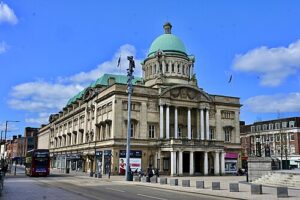
George Atkin M.D. (c. 1815 – 13 December 1861) was an orthodox physician who converted to homeopathy to become the editor of the British and Foreign Homeopathic Directory, Physician at the Hull Homeopathic Dispensary, General Secretary of the Northern Homeopathic Medical Association, a member of the British Homeopathic Society and the Hahneman Medical Society, a member of the Hahnemann Publishing Society, and a member of The Association for the Protection of Homeopathic Practitioners and Students. He was also President of the Royal Medical Society, a member of the Botanical Society of Edinburgh, and a council member of the Cuvierian Natural History Society.
George Atkin practiced at 56 Prospect Street, Kingston Upon Hull, Yorkshire, and at the Hull Homeopathic Dispensary, initially at 51 Waterworks Street, later 30 Whitefriargate, where his colleagues included surgeon Evan Fraser and homeopathic pharmacist Joseph Dixon (c. 1821 – 1883). Atkin’s successors at the Hull Dispensary were James Pyburn and, from 1888, John Paul Cavenagh.
George Atkin was born in Morpeth, Northumberland, the son of Presbyterian minister George Atkin (1785 – 1828) and Frances Coats Annett (1786 – 1872).
Atkin studied medicine at the University of Edinburgh, where he qualified M.D. in 1838, and earned a living as a medical tutor in the Portobello area of the city.
In April 1839, Atkin married Janet Anderson Poole (1816 – 1887). They would have seven children together.
It is unclear when George Atkin first converted to homeopathy but by July 1848 he was practicing homeopathically in Edinburgh. There, on 20 June 1848, Atkin opened the short-lived Portobello Homeopathic Dispensary, treating over 350 patients between then and November. Atkin also provided the first of his numerous contributions to the British Journal of Homoeopathy, with details of his treatment of a case of “spasmodic cholera.”
Later that year, in October and November, a serious outbreak of cholera in Edinburgh at the start of October prompted the committee of the Edinburgh Homeopathic Dispensary at 5 James Square, to remain open day and night, with a medical officer in attendance at all times. To support the Dispensary medical staff, consisting of John Rutherford Russell, Dionysius Wielobycki, Adam Lynchinski, and John Stuart Sutherland, Atkin and Dundee-based homeopath Dr. Samuel Cockburn also provided their services throughout the emergency. Russell later recorded the appreciation of the Edinburgh Dispensary for Atkin’s role during the crisis:
We cannot conclude this notice without expressing our obligation to Dr. Atkin (now of Hull) for the able manner in which he discharged the duties of House Physician, and for his services in preparing the various reports and tables which we have had occasion to use. Besides copying the cases in a book, for future reference, it fell to his department to make up the return for the Board of Health in London, which was transmitted to that body after the cessation of the epidemic.
The following year, 1849, Atkin became a member of the British Homoeopathic Society. That year he relocated permanently to Hull, where he founded a new homeopathic dispensary in the town and immediately confronted another cholera epidemic.
In 1853, George Atkin compiled and edited The British and Foreign Homeopathic Directory and Record, with the assistance of his colleagues Matthew James Chapman, Frederick Hervey Foster Quin, Robert Ellis Dudgeon, John Rutherford Russell, New York City homeopath James Whiting Metcalf, and an anonymous ‘friend’. The Directory was published by Manchester homeopathic chemist and publisher, Henry Turner, and was a response to the decision to suppress of all mention of homeopaths and their supporters by the editors of the London and Provincial Medical Directory.
After John Rutherford Russell retired from the editorial team at the British Journal of Homoeopathy in 1857, Atkin briefly replaced him, until his own untimely death.
George Atkin M.D. died at his Hull home on 13 December 1861, aged just 46, leaving a widow and six children.


Leave A Comment